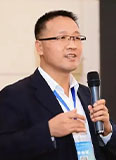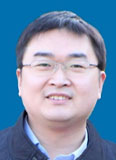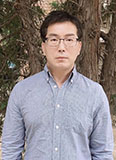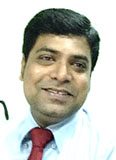Keynote Speakers
Prof.Lide Fang
Hebei University, China

Title: TBD
Abstract: TBD
Experience: Lide Fang, male, Doctor, professor of Hebei University, doctoral supervisor, visiting scholar of the University of Leeds. Now he is the dean of the College of Quality and Technology Supervision, the director of the National and local Joint Engineering Research Center of Measurement Instruments and Systems, the Key Laboratory of Energy Measurement and Safety Testing Technology of Hebei Province, and the national first-class professional leader of measurement and control technology and instruments. He was selected as a special subsidy expert of Hebei Provincial government, an outstanding scholar of Hebei Province's Three-three-Three Talents Project and Hebei University. He is also the executive director of China Metrology and Testing Society, vice chairman of the Traffic metrology Professional Committee of China Metrology and Testing Society, member of the national market supervision industry vocational Education Reference Committee, member of the national Traffic Metrology Technical Committee, vice chairman of China Metrology think Tank, Internet of Things metrology expert group, Vice president of Hebei Metrology Association. In recent years, he has published more than 100 academic papers in this professional field, participated in the compilation of more than 10 national standards and metrological technical specifications, presided over 20 standards and specifications, and applied for and authorized more than 60 patents. Presided over and participated in more than 30 national, provincial and ministerial level and horizontal scientific research projects, and won 9 awards as the first complete person, including 3 second prizes of Hebei Science and Technology Progress.
Prof. Jun Xu
Wuhan University of Technology, China

Title: 3D Visualization Technology and Its Application in Industrial Field
Abstract: The proposal of "Made in China 2025" strategy marks that the era of industrial intelligence has gradually arrived. With the informationtechnology rising, the industrial field has put forward new requirements on various systems’ construction, which is gradually developing towards the direction of integration and intelligence. In the operation and maintenance of modern industrial fields, the operation and maintenance level of equipment is one of the important indicators to measure their intelligence. With the continuous expansion of equipment scale and the increasing complexity of electrical control system, the emergence of visualization techniques such as BIM and WebGL, provides a new solution for industrial equipment, as well as operation and maintenance management. With the advantages of strong interaction and rich experience, 3D visualization technology is gradually applied to all kinds of skill training.
Experience: Xu Jun, male, from Xiangyang, Hubei, postdoctoral fellow, visiting researcher at Shangzhi University. He is currently the director of the Department of Process Equipment and control engineering of Wuhan University of Technology, the deputy director of the SMC Technology Center of Wuhan University of Technology, and a provincial entrepreneurship and innovation talent. He have been engaged in scientific research in the fields of integrated mechanical and electrical design, automated production line design and development, and remote operation and maintenance of process equipment for a long time. Led and completed 3 national and provincial research projects, published 38 academic papers, and obtained 24 patent authorizations and software copyright registrations. The research results of the project have won one second prize of the Hubei Provincial Science and Technology Progress Award and two achievements have been identified by the Hubei Provincial Department of Science and Technology.
Prof. Guohua Liu
Tiangong University, China

Title: TBD
Abstract:TBD
Experience: GuohuaLiu, member of the Tianjin Municipal Committee of the Agricultural Labor Party, chairman of the Branch Committee of Tianjin Polytechnic University, professor, master tutor, teaching teacher of the School of Mechanical Engineering of Tianjin Polytechnic University, excellent innovation and entrepreneurship tutor of Tianjin, has won the 2015 Advanced Individual of the Teaching Vanguard of Tianjin Polytechnic University, and the 2020 "Tianjin Excellent Science and Technology Volunteer". Tianjin Polytechnic University fourth "My favorite graduate tutor" a number of honorary titles.
Prof. Sanjeevikumar Padmanaban
University of South-Eastern Norway, Porsgrunn Campus, Norway

Title: Renewable & Modern Control – Power Electronics Technology
Abstract: Renewables, particularly PV solar, batteries, fuel-cell, and wind power going to have a pre-dominant business for the next 50 years. The renewables and Electric Vehicles (EVs) companies in the global market focused on the recent technologies towards Hydrogen (H2) and FC-VPT to improve Tank-To-Wheel (TTW) efficiency. The inherent benefits are cost-effective solutions for 'Eco' friendly, emission-free, and high-power capacity.
The power converters and control strategies play a crucial influence in boosting the renewables (PV, wind, fuel cell stack, batteries) power through voltage conversion. Therefore, ensure the demand for the vehicles' grid-connected systems, motor, and EV power trains. Several power converter topologies along with control algorithms are proposed for various grid-connected and vehicular applications. State-of-the-art technology, newly developed control strategies as an example with Hybrid ANFIS-PSO and Lyapunov function for Power Converter configuration for Fuel Cell – Vehicular Power Train (FC-VPT), Renewables, and Microgrids application will be discussed with the presentation.New power converters with the new modified version are viable and cost-effective solutions with reduced size and increased efficiency. The comprehensive review, and comparison of different control strategies for grid-connected/anti-islanding operation, Maximum PowerPoint Tracing with partial shading conditions, and suitability for various applications will be discussed in the presentation, with avoiding Phase-loop Lock (PLL).Finally, the advantages/disadvantages will be pointed out in the presentation for each converter's prominent features, challenges, and application for fuel cell (FC) technology, EVs, Microgrids, and Renewables.
Experience: S. Padmanaban has authored over 750+ scientific papers and received the Best Paper cum Most Excellence Research Paper Award from IET-SEISCON’13, IET-CEAT’16, IEEE-EECSI’19, IEEE-CENCON’19, and five best paper awards from ETAEERE’16 sponsored Lecture Notes in Electrical Engineering, Springer book. He is a Fellow of the Institution of Engineers, India, the Institution of Electronics and Telecommunication Engineers, India, and the Institution of Engineering and Technology, UK He received a lifetime achievement award from Marquis Who’s Who - USA 2017 for contributing to power electronics and renewable energy research. He is listed among the world’s top 2 scientists (from 2019) by Stanford University USA. His research areas are focused on power electronics applications in grid-connected converters, EVs, batteries, microgrids, and the development of DC/DC converters for renewable energy applications. Received Google citations of more than 16000 and Scopus index citations above 10,000 and impact on research in the field.

Copyright© ISMII2024
2024 10th International Symposium on Mechatronics and Industrial Informatics http://www.ismii.org/

